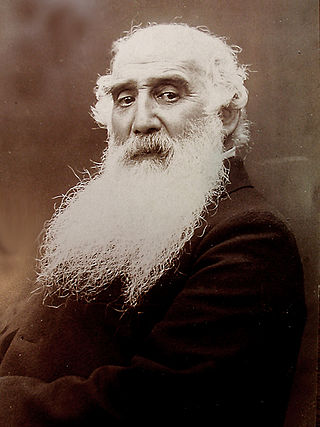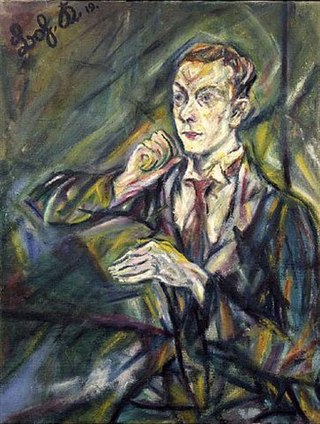Related Research Articles

Jacob Abraham Camille Pissarro was a Danish-French Impressionist and Neo-Impressionist painter born on the island of St Thomas. His importance resides in his contributions to both Impressionism and Post-Impressionism. Pissarro studied from great forerunners, including Gustave Courbet and Jean-Baptiste-Camille Corot. He later studied and worked alongside Georges Seurat and Paul Signac when he took on the Neo-Impressionist style at the age of 54.

Nazi plunder was organized stealing of art and other items which occurred as a result of the organized looting of European countries during the time of the Nazi Party in Germany.

Samuel Fischer, later Samuel von Fischer, was a Hungarian-born German publisher, the founder of S. Fischer Verlag.

Wilhelm Peter Bruno Lohse was a German art dealer and SS-Hauptsturmführer who, during World War II, became the chief art looter in Paris for Hermann Göring, helping the Nazi leader amass a vast collection of plundered artworks. During the war, Göring boasted that he owned the largest private art collection in Europe.

The Fred Jones Jr. Museum of Art is an art museum on the University of Oklahoma campus in Norman, Oklahoma.
Art theft and looting occurred on a massive scale during World War II. It originated with the policies of the Axis countries, primarily Nazi Germany and Japan, which systematically looted occupied territories. Near the end of the war the Soviet Union, in turn, began looting reclaimed and occupied territories. "The grand scale of looted artwork by the Nazis has resulted in the loss of many pieces being scattered across the world."

The Kronprinzenpalais is a former Royal Prussian residence on Unter den Linden boulevard in the historic centre of Berlin. It was built in 1663 and renovated in 1857 according to plans by Heinrich Strack in Neoclassical style. From 1919 to 1937, it was home to the modern art collection of the National Gallery. Damaged during the Allied bombing in World War II, the Kronprinzenpalais was rebuilt from 1968 to 1970 by Richard Paulick as part of the Forum Fridericianum. In 1990, the German Reunification Treaty was signed in the listed building. Since then, it has been used for events and exhibitions.

Kajetan "Kai" Mühlmann was an Austrian art historian who was an officer in the SS and played a major role in the expropriation of art by the Nazis, particularly in Poland and the Netherlands. He worked with Arthur Seyss-Inquart in the initial Nazi government in Vienna following the Anschluss, in the General Government and in The Hague where he headed an organisation known as the Dienststelle Mühlmann which functioned as a clearing house for art expropriated in the occupied Netherlands. He has been characterised as one of the greatest art thieves among the Nazis, and possibly ever.

The Gurlitt Collection was a collection of around 1,500 art works assembled by Cornelius Gurlitt, the son of one of Hitler's official art dealers, Hildebrand Gurlitt (1895–1956), and which was found to have contained several artworks looted from Jews by the Nazis.

Karl Haberstock was a Berlin art dealer who trafficked in Nazi-looted art. Haberstock's name appears 60 times in the Art Looting Investigation Unit (ALIU) Reports 1945–1946 and ALIU Red Flag Names List and Index.

Otto Kallir was an Austrian-American art historian, author, publisher, and gallerist. He was awarded the Silbernes Ehrenzeichen für Verdienste um das Land Wien in 1968.
The German Nazi Party looted and stole art, gold and other objects that had been either plundered or moved for safekeeping at various storage sites during World War II. These sites included salt mines at Altaussee and Merkers and a copper mine at Siegen.

The Diggers or Two Diggers is an oil painting by Dutch artist Vincent van Gogh painted in late 1889 in Saint-Rémy-de-Provence, France. It is in the Detroit Institute of Arts (DIA), Detroit, Michigan, United States. The Diggers is sometimes called Two Diggers among Trees to distinguish it from The Diggers , 1889.

Many priceless artworks by the Dutch post-impressionist artist Vincent van Gogh were looted by Nazis during 1933–1945, mostly from Jewish collectors forced into exile or murdered.

Otto Kümmel was a German art historian, academic teacher, founder and director of the Museum of Asian Art in Berlin and general director of the Berlin State Museums.
Maria Almas-Dietrich, nee Dietrich was one of Hitler's most important art suppliers for his planned FührerMuseum in Linz.
Helga Kreuter-Eggemann, née Helga Eggemann, was a German art historian involved in looting art in France during the Nazi occupation.

Erhard Göpel was a German art historian and high level Nazi agent who acquired art, including looted art, for Hitler’s Führermuseum.
References
- 1 2 3 4 Boehm, Mike (2008-04-15). "Prof ensnared in case of Pissarro looted by Nazis". Los Angeles Times . Retrieved 2008-07-27.
- 1 2 "Jonathan Petropoulos curriculum vitae" (PDF). Claremont McKenna College. June 2006. Archived from the original (PDF) on 2011-06-06. Retrieved 29 Dec 2008.
- ↑ Blumenthal, Ralph (2003-03-03). "Panel on Nazi Art Theft Fell Short, Experts Say". New York Times . Retrieved 2008-07-27.
- ↑ Petropolous, Jonathan (July 2005). "Report of Professor Jonathan Petropoulos, Claremont McKenna College" (PDF). Burris, Schoenberg & Walden, LLP.
- ↑ "Professor Petropoulos Featured in Documentary About Nazi Art Thefts". Claremont McKenna College. 2007-10-18. Archived from the original on 2008-01-23. Retrieved 2008-07-27.
- ↑ Petropoulos, Jonathan. Art As Politics in the Third Reich, University of North Carolina Press, 1999. ISBN 0-8078-4809-3
- ↑ Petropoulos, Jonathan. The Faustian Bargain: The Art World in Nazi Germany, Oxford University Press, 2000. ISBN 0-19-512964-4
- ↑ Petropoulos, Jonathan. Royals and the Reich, Oxford University Press, 2006. ISBN 0-19-516133-5
- ↑ Petropoulos, Jonathan and Roth, John, editors. Gray Zones: Ambiguity and Compromise in the Holocaust and Aftermath, Berghahn Books, 2005. ISBN 1-84545-302-6
- 1 2 Koldehoff, Stefan (Summer 2007). "Pissarro Lost and Found" (PDF). ARTnews. Archived from the original (PDF) on 2011-07-16. Retrieved 2008-07-27.
- 1 2 Hickley, Catherine (2007-06-06). "Nazi-Looted Pissarro in Zurich Bank Pits Heiress Against Dealer". Bloomberg News . Retrieved 2008-07-27.
- ↑ Fletcher, Rachel (2008-03-17). "Fee row over found Pissarro". Jewish Chronicle. Archived from the original on 2009-03-12. Retrieved 2008-09-28.
- ↑ Hickley, Catherine (2009-06-02). "Gestapo-Looted Pissarro Seized in Swiss Safe Goes on Auction". Bloomberg News . Retrieved 2009-06-05.
- ↑ "Christie's auction results for November 3, 2009: Camille Pissarro (1830-1903) Le Quai Malaquais et l'Institut". Christie's. 2009-11-03. Retrieved 2009-11-25.
- ↑ Tully, Judd (2009-11-03). "Season Opens Softly at Christie's". ARTINFO. Retrieved 2009-11-25.